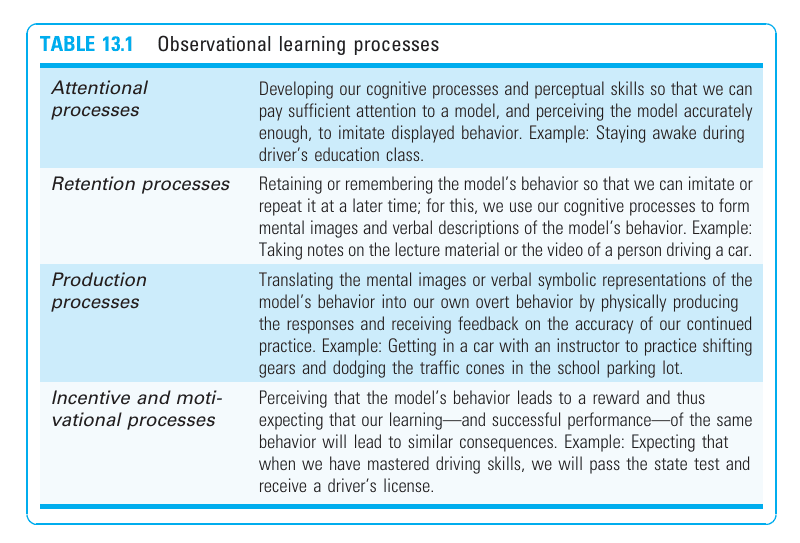Introduction
Bandura’s Self-Efficacy Theory plays a crucial role in understanding motivation in various fields, including education, health, and work performance. Self-efficacy, a central concept in Albert Bandura’s social cognitive theory, refers to an individual’s belief in their ability to execute specific tasks successfully (Bandura, 1977). This belief significantly influences motivation, determining how much effort individuals put into achieving their goals and how they persist in the face of challenges.
Read More- Bandura’s Learning Theory
Sources of Self-Efficacy
Bandura (1997) identified four key sources of self-efficacy beliefs-
Sources of Self-Efficacy
- Mastery Experiences – Direct experiences of success strengthen self-efficacy, while repeated failures can weaken it. Successfully overcoming challenges reinforces confidence in one’s abilities (Bandura, 1997).
- Vicarious Experiences – Observing others, particularly those who are similar to oneself, successfully complete tasks can enhance self-efficacy (Schunk & DiBenedetto, 2021).
- Social Persuasion – Encouragement and positive feedback from others can help individuals believe in their capabilities, thereby enhancing motivation (Usher & Pajares, 2008).
- Physiological and Emotional States – Mood, stress levels, and physical well-being influence self-efficacy. Anxiety and fatigue may lower self-efficacy, whereas positive emotional states can boost it (Maddux, 2012).
Impact of Self-Efficacy on Motivation
Self-efficacy plays a critical role in motivation, influencing various aspects of goal-setting and achievement:
- Choice of Activities: Individuals with high self-efficacy are more likely to engage in challenging tasks and take on difficult goals (Schunk & DiBenedetto, 2021).
- Effort and Persistence: People with strong self-efficacy exert more effort and display greater persistence when facing obstacles (Bandura, 1997).
- Performance and Achievement: Higher self-efficacy is associated with better performance outcomes in academic, professional, and personal domains (Usher & Pajares, 2008).

Observational Learning
Applications of the Theory
Some application of the theory includes-
1. Education
In academic settings, self-efficacy impacts student motivation and learning outcomes. Students with high academic self-efficacy are more likely to adopt effective study strategies, persist through academic challenges, and perform better in school (Schunk & DiBenedetto, 2021). Teachers can enhance students’ self-efficacy by providing mastery experiences, modeling successful behaviors, and offering constructive feedback (Usher & Pajares, 2008).
2. Workplace Motivation
Self-efficacy also influences workplace motivation and job performance. Employees with high self-efficacy set ambitious career goals, demonstrate resilience in the face of setbacks, and are more likely to take on leadership roles (Maddux, 2012).
Conclusion
Bandura’s Self-Efficacy Theory is a foundational framework for understanding motivation. By fostering self-efficacy through mastery experiences, vicarious learning, social persuasion, and emotional regulation, individuals can enhance their motivation and achieve higher levels of success in various domains.
References
Bandura, A. (1977). Self-efficacy: Toward a unifying theory of behavioral change. Psychological Review, 84(2), 191-215. https://doi.org/10.1037/0033-295X.84.2.191
Bandura, A. (1997). Self-efficacy: The exercise of control. W. H. Freeman.
Maddux, J. E. (2012). Self-efficacy: The power of believing you can. In R. Snyder & S. Lopez (Eds.), Handbook of Positive Psychology (2nd ed., pp. 277-287). Oxford University Press.
Schunk, D. H., & DiBenedetto, M. K. (2021). Motivation and social-emotional learning: Theory, research, and practice. Contemporary Educational Psychology, 64, 101947. https://doi.org/10.1016/j.cedpsych.2021.101947
Usher, E. L., & Pajares, F. (2008). Sources of self-efficacy in school: Critical review of the literature and future directions. Review of Educational Research, 78(4), 751-796. https://doi.org/10.3102/0034654308321456
Subscribe to Careershodh
Get the latest updates and insights.
Join 16,370 other subscribers!
Niwlikar, B. A. (2025, April 10). Bandura’s Self-Efficacy Theory for Motivation and 4 Important Sources of Self-Efficacy. Careershodh. https://www.careershodh.com/banduras-self-efficacy-theory/
